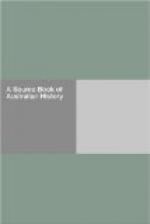The next topic which I have put down to address you upon, is one with respect to which I should have wished to have had time to arrange my thoughts—it is the cheapening of the law of Conveyancing of real property. (Applause.) Next to affording fair facilities for obtaining possession of the waste lands of the Crown, and converting them into cornfields and homesteads of independent yeomanry, it is the duty of the State to afford a cheap and at the same time a secure mode of conveying that property from man to man. (Hear, hear.) I have for years felt that the law of England in that respect, which we brought with us, required amendment. In looking also to the laws of other countries with respect to the transfer, mortgage, or encumbrance of real property, I have come to the conclusion that the law of England is inferior to most of them with regard to cost and security of title. The old Conservative feeling of England adheres with a sort of veneration to laws and usages respecting title which originated under the feudal system, and is loath to abandon them for a system adapted to the requirements of modern civilization. I would illustrate my views by observing that, in ancient times, before the Wars of the Roses, a baron, or even a yeoman, would surround his residence with a moat to be crossed only by a drawbridge, and instead of the convenient door of modern times, he would have a portcullis, which he would raise or let fall to admit a friend, or exclude a foe. A visitor, too, would have instead of gaining immediate access, to sound a horn at an outer gate, and hold parley with a warder upon a lofty tower, before he could gain admission. There could be no doubt that all these ceremonies and parleyings were necessary in those days, but it does not follow that we should carry them out in our times. Were any person now, to surround his residence with a deep and broad ditch, and observe those ceremonies when a visitor called upon him, we would call him insane; yet, that is precisely what we do with regard to the transfer of real estate, observing still the tortuous roundabout methods of conveying, resorted to in those days for the purpose of evading the oppressions of feudalism. Nay, the analogy is so strong, that in our Law Courts, and Deeds we still use the same barbarous Norman French jargon in which the parley was in those ancient days held at the gate of the baronial residence. (Hear, and applause.) It is perhaps presumptuous of a person who has not received a legal education, to address his mind to this question; seeing, however, that the persons who, by ability, and education, are best fit to cope with the subject, are not willing, or, at least have not done so, I have taken the task upon myself. (Hear, hear). With your permission, I will give you an outline of the plan. The purchaser of land from the Crown shall receive a title deed, a land grant, as at present to be executed in duplicate, and one copy filed in the Registrar-General’s




